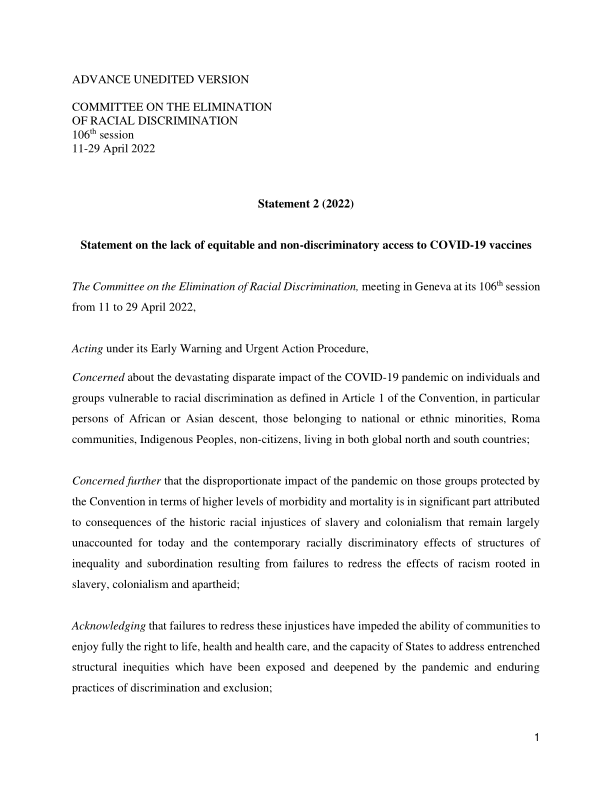After a complaint submitted by CESR and allies, the UN Committee on the Elimination of Racial Discrimination (CERD) called out Germany, Switzerland, the UK, and the US for violating international law and replicating colonial hierarchies by blocking access to COVID vaccine and treatment technologies.

In a historic statement released this week, the United Nations Committee on the Elimination of Racial Discrimination (CERD) starkly warned that “only 15.21% of the population of low-income countries has received even one vaccine dose, creating a pattern of unequal distribution within and between countries that replicates slavery and colonial-era racial hierarchies.” As the Committee notes, under the International Convention for the Elimination of All Forms of Racial Discrimination, States are obligated to eliminate all forms of racial inequities.
The statement comes in response to a complaint submitted by CESR and an international coalition of human rights law groups, public health experts, and civil society organizations, arguing that Germany, Switzerland, the UK, and the US are in violation of international human rights law by failing to intervene on what has been an inequitable and racially discriminatory rollout of COVID vaccines and other healthcare technologies. The complaint urged the Committee to take action in advance of the upcoming World Trade Organization’s Ministerial Conference, where it is anticipated that States will consider the proposal to waive intellectual property barriers.
Acting on the petition submitted under their Early Warning and Urgent Action procedure, the Committee stressed “the insufficient supply of vaccines due to unequal global distribution necessitates urgent measures in relation to the intellectual property regime,” which restricts the supply of COVID-19 healthcare technologies through a web of patents, trade secrets, and other monopoly protections.
The Committee called specifically on Germany, Switzerland, the UK, and the US to support “the proposal of a comprehensive temporary waiver on the provisions of the [Trade-Related Intellectual Property Rights] (TRIPS) Agreement,” among other measures to mitigate the disparate impact of the pandemic. The Committee also held the named States to account for failing “to mandate COVID-19 healthcare technology transfers from nationally based pharmaceutical companies,” recalling their obligation “to ensure equal access to lifesaving healthcare services, including testing, vaccines and medical treatments.”
-
“Vaccine inequity is neither an unfortunate accident nor something inevitable. It is rooted in the failure of States globally to address the historical legacies of slavery, colonialism and apartheid which persist despite their formal abolition. The statement is a strong call for States to put the right to health and life of millions over private profit, and underscores the importance of global solidarity in fighting this pandemic, especially the enormous debt owed by countries in the Global North to those in the Global South,” said Ohene Ampofo-Anti, Program Associate at CESR.
-
"Global vaccine equity demands collective action, cooperation and solidarity," said Labila Sumayah Musoke of the Initiative for Social and Economic Rights (ISER) based in Uganda.
-
“The ongoing vaccine imperialism just highlights the continued impact of structural racism, legacies of colonialism, and racialized capitalism on Black, Indigenous, and people of color in their diversity and other vulnerable and marginalised groups. Therefore we cannot talk of a new normal without dismantling these persistent systems of oppression and this is essential not only to end the pandemic but also ensure sustainable health equity.” - Statement of the Global South Vaccine Equity Coalition coordinated by Campaign against Racism of Equal Health.
-
“At a time when calls for ending structural discrimination have finally taken root, the behavior of the States implicated in this, in failing to take adequate measures - with their own problematic histories, shows the shallowness of their commitment to these values,“ said Joshua Castellino, Executive Director, Minority Rights Group (MRG).
-
“The critical work to decolonise global health needs to move forward now more than ever. Countries in the Global South currently navigating a fifth wave of death, illness and destruction of livelihoods as a result of a profit-fueled pandemic is all the testament we need. If there was any doubt about whose lives matter to countries that claim to be ‘developed’, the injustice that is staring us in the face is a clear answer to that question,” said Tian Johnson, African Alliance.
-
“This decision is crucial to Latin America, a region that is in great part black and indigenous. Because of their transnational nature, Northern countries and transnational companies are rarely made accountable for the regimes they create to protect their own profit, with enormous impacts over the rights of marginalized populations in the Global South. While Latin America must debate the need to enhance its own production of pharmaceuticals, at the global level it is important to ask ourselves if applying intellectual property restrictions to healthcare technology is even compatible with recognizing the right to life of every human being,” said Camila Barretto Maia, Coordinator of the International Area at Centro de Estudios Legales y Sociales (CELS).
-
“Within our context, it is especially Black African women who work in the most precarious of working environments who face intersecting forms of discrimination and who carry the burden of the lack of access to adequate medical treatment and health care who are being overlooked and dismissed in favour of corporate and commercial interests. The statement finally recognises that their voices have been calling out and that women will no longer be silenced.” - Statement of the Women’s Legal Centre - South Africa.
The CERD statement is significant for its recognition of the historical root causes of the present COVID-19 vaccine and healthcare inequity, both within and among States, and how opposition to the TRIPS waiver sustains structural racial subordination. As the Committee noted, the “disproportionate impact of the pandemic on those groups protected by the Convention in terms of higher levels of morbidity and mortality is in significant part attributed to consequences of the historic racial injustices of slavery and colonialism that remain largely unaccounted for today and the contemporary racially discriminatory effects of structures of inequality and subordination resulting from failures to redress the effects of racism rooted in slavery, colonialism and apartheid.”
Moreover, the statement stands out for acknowledging structural racism as a global system that States have a duty to eradicate. In this regard, the Committee expressed deep concern that “the pattern of unequal distribution of lifesaving vaccines and COVID-19 technologies between and within countries manifests as a global system privileging those former colonial powers to the detriment of formerly colonized States and descendants of enslaved groups.” The statement can be read as an acknowledgment of the extra-territorial obligations which States owe to ensure the realization of economic and social rights for all, even those beyond their borders. This underscores the importance of global solidarity in addressing the ongoing effects of the pandemic, especially on the most marginalized groups.
